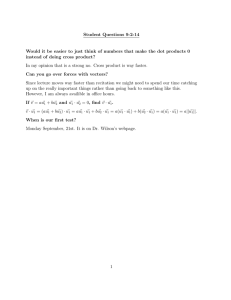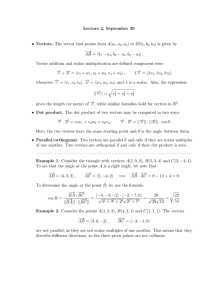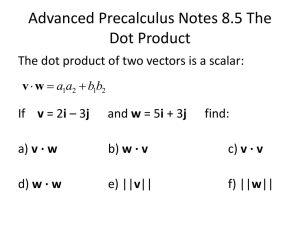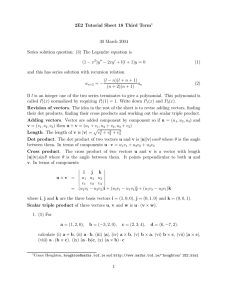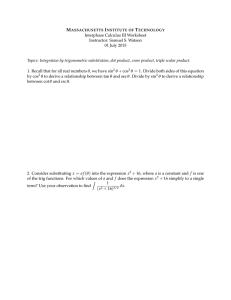Lesson 3. The Dot Product 1 Today...
advertisement
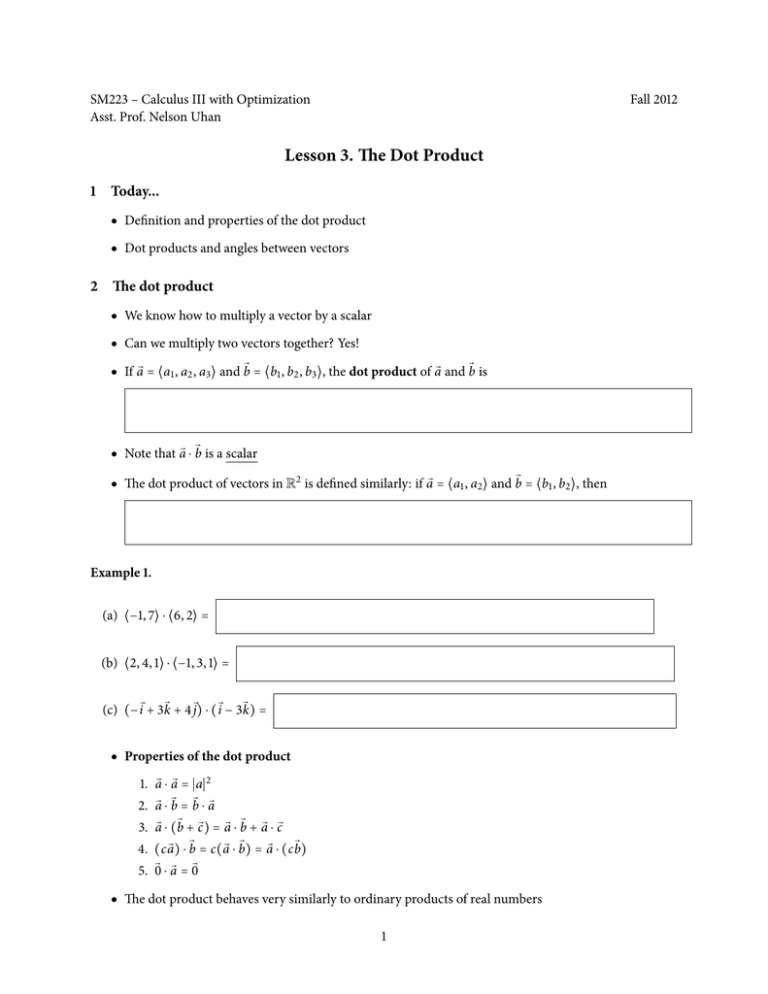
SM223 – Calculus III with Optimization Asst. Prof. Nelson Uhan Fall 2012 Lesson 3. The Dot Product 1 Today... ● Definition and properties of the dot product ● Dot products and angles between vectors 2 The dot product ● We know how to multiply a vector by a scalar ● Can we multiply two vectors together? Yes! ● If a⃗ = ⟨a1 , a2 , a3 ⟩ and b⃗ = ⟨b1 , b2 , b3 ⟩, the dot product of a⃗ and b⃗ is ● Note that a⃗ ⋅ b⃗ is a scalar ● The dot product of vectors in R2 is defined similarly: if a⃗ = ⟨a1 , a2 ⟩ and b⃗ = ⟨b1 , b2 ⟩, then Example 1. (a) ⟨−1, 7⟩ ⋅ ⟨6, 2⟩ = (b) ⟨2, 4, 1⟩ ⋅ ⟨−1, 3, 1⟩ = (c) (− ⃗i + 3⃗k + 4 ⃗j) ⋅ ( ⃗i − 3⃗k) = ● Properties of the dot product 1. a⃗ ⋅ a⃗ = ∣a∣2 2. a⃗ ⋅ b⃗ = b⃗ ⋅ a⃗ 3. a⃗ ⋅ (b⃗ + c⃗) = a⃗ ⋅ b⃗ + a⃗ ⋅ c⃗ ⃗ = a⃗ ⋅ (c b) ⃗ 4. (c a⃗) ⋅ b⃗ = c( a⃗ ⋅ b) 5. ⃗0 ⋅ a⃗ = ⃗0 ● The dot product behaves very similarly to ordinary products of real numbers 1 Example 2. Show property 1: a⃗ ⋅ a⃗ = ∣a∣2 . 3 Dot products and angles ⃗ ● The angle θ between two vectors a⃗ and b: z b⃗ a⃗ θ y x ○ We always take the angle so that 0 ≤ θ ≤ π ● If a⃗ and b⃗ are scalar multiples of one another, we say that the vectors are parallel ○ If a⃗ and b⃗ are parallel, then θ = ⃗ then ● If θ is the angle between vectors a⃗ and b, ⃗ then ⇒ If θ is the angle between nonzero vectors a⃗ and b, Example 3. Find the angle between vectors a⃗ = ⟨2, −1, 3⟩ and b⃗ = ⟨−3, 2, 5⟩. 2 ● Two nonzero vectors a⃗ and b⃗ are called perpendicular or orthogonal if the angle between them is θ = π/2 ● Suppose a⃗ and b⃗ are nonzero ○ If a⃗ and b⃗ are perpendicular, then a⃗ ⋅ b⃗ = ○ If a⃗ ⋅ b⃗ = 0, then cos θ = and so θ = ⇒ Two vectors a⃗ and b⃗ are orthogonal if and only if Example 4. Show that 2 ⃗i − ⃗j + 2⃗k is perpendicular to 5 ⃗i + 2 ⃗j − 4⃗k. ● The dot product measures the extent to which a⃗ and b⃗ point in the same direction ○ b⃗ θ a⃗ ○ b⃗ θ a⃗ ○ b⃗ θ a⃗ 3
